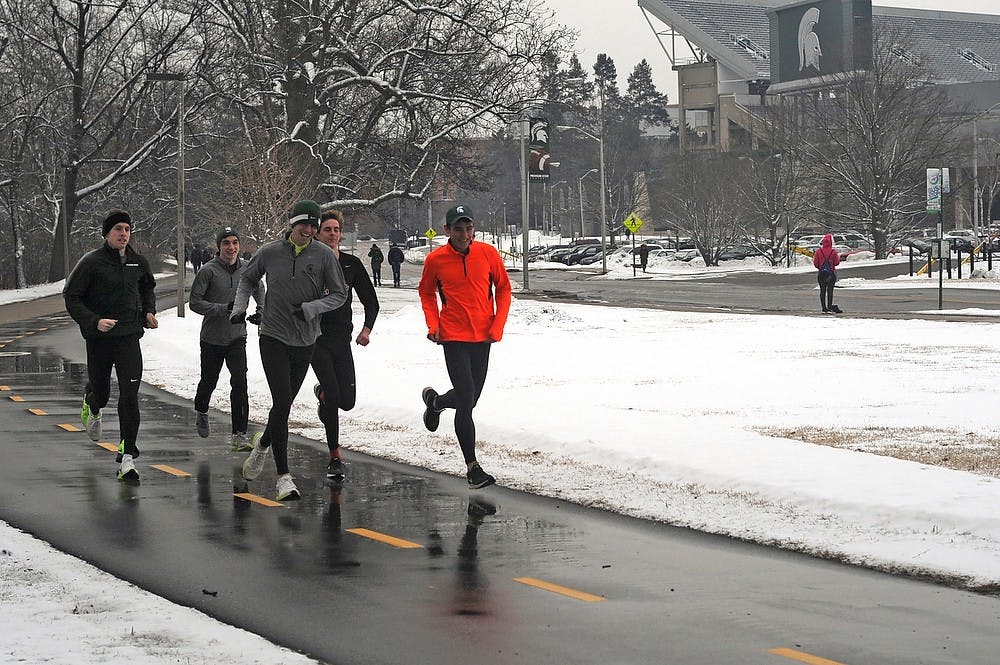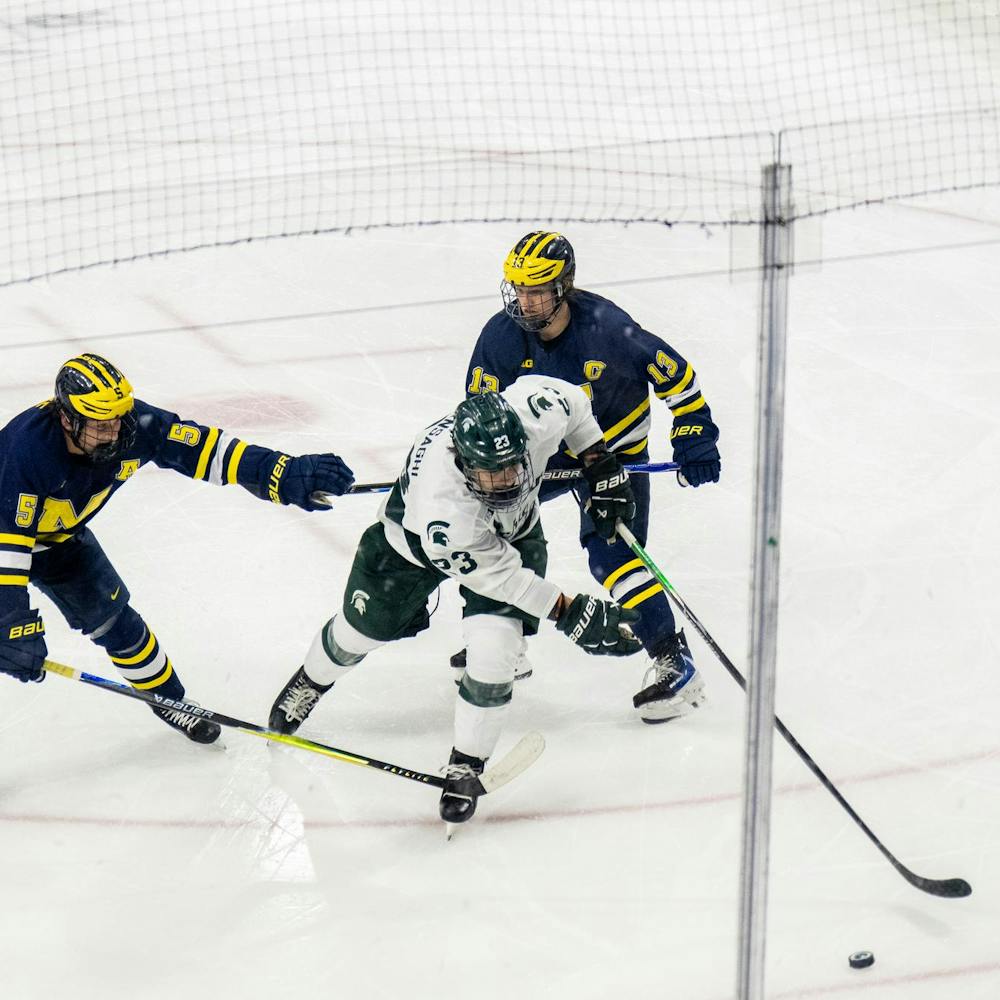The members of MSU men’s cross country team have trained through their share of inclement weather. Whether it be pouring rain, the scorching heat of the summer or any of the countless miles spent running through the polar vortex, they’ve been through it all.
But on this particular run, as the boys trudged through the subzero degree temperatures along Mt. Hope Road, a busy highway situated just south of campus, it was becoming clearer by the second that they’d never experienced anything like this. At least not to this magnitude.
The boys were caught in the middle of a blizzard.
With cars whizzing by on Mt. Hope, the pack of runners pushed through the frigid wind and snow swirling in their faces. With the shockingly cold air causing their eyes to water like mad, the tears began to freeze to their wind-burned faces.
The way sophomore Garret Zuk describes it, he’s lucky to have made it back in one piece.
“All of our eyelids were filling with ice, so our eyes were getting frozen shut,” Zuk said. “I remember at one point drifting into Mt. Hope Road and one of my teammates grabbed me and pulled me back off the road because I couldn’t see where I was going.”
Eventually, the team did make it back.
And the steps taken on that run were just one collective step among many that are taken in the process of training for a season.
Training through the cold
MSU cross country and track head coach Walt Drenth is no stranger to running in the cold. A native of northern Michigan’s Charlevoix, where he was a standout runner in high school and later a varsity runner at Central Michigan, Drenth has certainly had his fair share of character-building runs.
Drenth can remember a time back in Charlevoix, where he was dropped off for about a 4.5 mile run. And for a route that normally took him about 25 minutes to complete, Drenth said it took him an hour and a half — just because the snow was so deep.
“I guess we all have stories of the cold,” Drenth said. “I remember one year it was really, really cold. And just to avoid the wind chill, I did 10 miles in a parking structure.”
Like Drenth, many of the members of the team also hail from Michigan — meaning they’ve grown somewhat accustomed to training in the cold. But sophomore Sherod Hardt, a native of Queen Creek, Arizona, didn’t even have warm clothes when he arrived in the mitten state.
“Thankfully (our team) got some warm clothes ... and some gear, so that was able to keep me warm,” Hardt said, recounting his first winter in Michigan back in 2010-2011, which he says was incredibly tame in comparison to last year’s winter.
Despite how cold it can get sometimes, Drenth and many of his runners agree that the cold weather isn’t necessarily always the biggest factor.
“Last winter was definitely a lot more rough. This year we’ve at least been able to be outside every day. I think coach’s cutoff is negative 30,” Zuk said with a laugh. “The hardest thing is the footing. The temperature itself isn’t the worst thing. You just wear enough layers. But you also have to be careful. We do a lot of warm-up exercises and different dynamic things for lateral movement with hips and things to keep you from going down on the ice.”
But there are still the days when the weather is bad enough to call for some adjustments to be made to that day’s training plan. It is during these times where the coaching staff will try to implement strategies such as dropping runners off at a point and letting them run a route with the wind entirely at their backs.
When it’s brutally cold — such as the case when classes were canceled at the beginning of the spring 2014 semester — Drenth said his runners reluctantly ran nine miles indoors at Jenison Field House. That’s 72 laps around the indoor track.
Still, training through adversity like this is all part of the process it takes to being successful.
“It’s really not as bad as people make it seem to be,” junior Lindsay Clark said. “Having a team definitely helps because we all run together and we’re all in it together. But there are definitely the harder days when it’s really cold outside and we have to cover our face and wear really thick clothes. But when it comes down to it, it’s just part of the grind.”
What doesn’t kill you makes you stronger
There comes a moment or two in every runner’s career when their diligence is put to the test. For Clark, one of those moments came on a run a few weeks ago when she and her teammates hit a mile and half stretch straight into the wind.
“It’s one of those times when you’re asking yourself ‘why are we doing this sport?’” Clark said. “But when you finish you’re like ‘OK that was worth it.’ It makes us tougher and gives us a good mentality.”
Drenth also sees how consistently training in less than ideal situations has helped shape his athletes into what they’ve become today.
“You have to develop a particular mentality to not only to sustain training but to do it every day,” Drenth said. “Also if you want to be good, you shrug your shoulders and say ‘this is just what it is.’ I think it develops a particular type of toughness, maybe more of a mentality that will help them at a certain point in a competitive race or difficult situation — particularly when we’re in the spring when we might face bad conditions or in the fall when the weather essentially evolves into winter.”
That toughness was put to the test this fall, as the women were preparing to run in the frigid air of Madison, Wisconsin, for the Great Lakes Regional Cross Country Championships.
“All of us were kind of dreading it but coach Drenth said, ‘You’ve got to embrace it and accept the fact that it’s going to be cold,’” Clark said.
The Spartan women did embrace it — so much so that they went on to win the meet by a landslide. The victory served as a key achievement en route to their first national championship in program history.
“I think it’s what makes us tough as Michigan State Spartans,” senior Sara Kroll said. “Even though we train outside and footing might not be great and the temperatures are low, we still get quality work in, which is really great so that when we do get the opportunities to race, we’re pretty sharp and ready to go.”
In the meantime, the members of the team will continue to train through the winter for both indoor and outdoor track by logging anywhere from 50 to 100 miles a week — many of which spent running through the cold with frozen eyelashes and slippery footing.
“It’s part of the fun of Michigan, I guess,” Zuk said.







